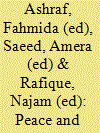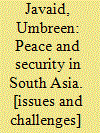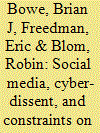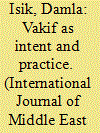|
|
|
Sort Order |
|
|
|
Items / Page
|
|
|
|
|
|
|
| Srl | Item |
| 1 |
ID:
046198


|
|
|
|
|
| Publication |
Islambad, Institute of Strategic Studies, 2002.
|
| Description |
174p.
|
|
|
|
|
|
|
|
|
|
|
|
Copies: C:1/I:0,R:0,Q:0
Circulation
| Accession# | Call# | Current Location | Status | Policy | Location |
| 046061 | 327.1720954/ASH 046061 | Main | On Shelf | General | |
|
|
|
|
| 2 |
ID:
072777


|
|
|
|
|
| Publication |
Lahore, Pakkistan Studies Centre, 2006.
|
| Description |
ix, 238p.
|
| Standard Number |
9698181024
|
|
|
|
|
|
|
|
|
|
|
|
Copies: C:1/I:0,R:0,Q:0
Circulation
| Accession# | Call# | Current Location | Status | Policy | Location |
| 051406 | 327.1720954/JAV 051406 | Main | On Shelf | General | |
|
|
|
|
| 3 |
ID:
127586


|
|
|
|
|
| Publication |
2012.
|
| Summary/Abstract |
Recent world events have demonstrated that the Internet-and social media tools in particular-are increasingly useful for political organizing, not merely frivolous virtual spaces for youthful publics to connect socially. Rather, social media is touted as "the crucible in which repressed civil societies can revive and develop." For the people of Central Asia-where free expression is curtailed and news outlets are under official or non-state, non-official government censorship-information and communication technology (ICT) provides an increasingly important vehicle for political expression. Blogging and social media tools may fulfill a crucial role for non-journalists and oppositional groups that journalism serves in more democratic societies, as recent events in Tunisia, Egypt, and Iran illustrate.
|
|
|
|
|
|
|
|
|
|
|
|
|
|
|
|
| 4 |
ID:
131563


|
|
|
|
|
| Publication |
2014.
|
| Summary/Abstract |
Through ethnographic and archival research conducted in Istanbul and Izmir, this article examines the dynamics and regulation of charitable giving in contemporary Turkey. The article is based on interviews I conducted with the volunteers, employees, and aid recipients of three civil society organizations that rely on charitable giving to fund their projects, which center on helping the poor and providing aid during and after wars and other disasters. I document how religious ideals of anonymous charitable giving for the sake of giving, without expectation of return, are closely intertwined with anxiety over finding a worthy charitable association and recipient. In doing so, I focus on vak?f as both a concept and a practice that gives meaning to charitable giving in Turkey. The increasing desire to document, define, and categorize the deserving poor as a way to justify the intent to give and to receive goes against the anonymity and immediacy of giving, thus riddling intent with ethical contradictions. I argue that attention needs to be paid to the intent, practice, and various forms of giving, and not just to the effects and outcomes of charity.
|
|
|
|
|
|
|
|
|
|
|
|
|
|
|
|
|
|
|
|
|